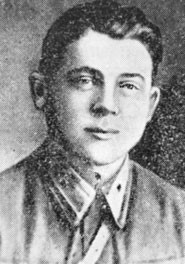
Abram Zindels
Abram Zindels was born in 1915 in the town of Lipovets, about 20 miles east of Vinnitsa, Ukraine. His father Moisei (Moishe) was a glazier. Upon completing seven grades of a general education school, he worked as a metalworker at a local MTS (machine-tractor agricultural station). Later he entered the Vinnitsa construction tekhnikum (technical college), but had to leave because of financial hardship. In 1937 he was drafted into the Red Army. After finishing this military service, he returned to work at his old MTS. In 1940 he was drafted again and took part in the Soviet annexation of Bessarabia in June 1940.
After the German attack on the Soviet Union in June 1941, Zindels was attached to the 169th Infantry Division deployed on the South-Western Front. He fought to defend Ukraine and took part in the general Red Army retreat in summer 1941. In September 1941 his division was encircled by the Germans. When the division tried to break out of encirclement, Zindels was captured but somehow survived. At the beginning of 1943, Zindels was liberated from the POW camp by advancing units of the Red Army's Southern Front. He underwent a long process of screening by a "special department" and then sent first to a "reserve regiment" of the Southern Front and, later to the 690th Infantry Regiment of the same front.
In October 1943 a storm group (an infantry company reinforced with an artillery battery, two tanks, and a sapper unit) under the command of Second Lieutenant Zindels took part in the recapture of the town of Melitopol in south-eastern Ukraine. After heavy fighting (during which his unit destroyed five enemy tanks), the platoon led by Zindels broke into the building of the prewar department store, where the HQ of a Wehrmacht company was located. The battle inside the department store took the form of hand-to-hand fighting, in which both sides used the butts of their rifles and even sapper shovels. The Germans succeeded in surrounding the building and proceeded to kill off the Soviet soldiers one after the other. Only Zindels remained alive. When several German soldiers approached, evidently attempting capture him alive, Zindels exploded his last anti-tank grenade, killed himself along with eight enemy soldiers.
In November 1943 Abram Zindels was posthumously awarded the title of Hero of the Soviet Union. He was buried in a common grave on the eastern edge of town. On October 18, 1943, the day when Zindels perished, he was only 27 years old.
